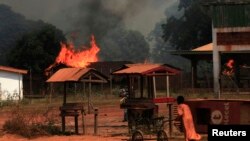The United Nations says violence in the Central African Republic has now displaced nearly one million people from their homes, and that a lack of security is making it difficult to meet humanitarian needs.
In a statement Friday, the U.N. refugee agency said looting, attacks against civilians and the presence of armed groups at some shelters are hampering efforts to help those in need of assistance.
In the capital, Bangui, Doctors Without Borders says it has temporarily suspended most of its medical services at a facility near the airport, where about 100,000 people have sought refuge from the violence.
The aid group's CAR emergency coordinator, Carolina Lopez, says civilians at the site have been shot.
"We have wounded people coming that were injured inside of the site," she says. "And one six month [old] baby died because of the bullets."
Lopez says it is unclear what armed groups are responsible for the shootings and if the civilians are being deliberately targeted.
She says the shootings have prompted the relief organization to suspend all but emergency care at the site.
"Right now, we are not able to provide the services that are in need, and it is because we have decided to decrease some of our services in the airport, because we do not feel comfortable with these bullets coming into the camp."
CAR's unrest began in March when mostly Muslim Seleka force overthrew President Francois Bozize. Much of the fighting since then has been between ex-Seleka rebels and Christian anti-balaka militias.
Relief organizations say more than 1,000 people have been killed in the unrest.
On Tuesday, the United Nations Children's Fund said attacks against children in CAR had "sunk to a vicious new low."
It said at least 16 children had been killed in violence in Bangui since December 5, including two who were beheaded. The group also said an increasing number of children were being recruited into armed groups.
The unrest has continued despite the presence of several thousand French and African soldiers who have attempted to disarm the militias.
In a statement Friday, the U.N. refugee agency said looting, attacks against civilians and the presence of armed groups at some shelters are hampering efforts to help those in need of assistance.
In the capital, Bangui, Doctors Without Borders says it has temporarily suspended most of its medical services at a facility near the airport, where about 100,000 people have sought refuge from the violence.
The aid group's CAR emergency coordinator, Carolina Lopez, says civilians at the site have been shot.
"We have wounded people coming that were injured inside of the site," she says. "And one six month [old] baby died because of the bullets."
Lopez says it is unclear what armed groups are responsible for the shootings and if the civilians are being deliberately targeted.
She says the shootings have prompted the relief organization to suspend all but emergency care at the site.
"Right now, we are not able to provide the services that are in need, and it is because we have decided to decrease some of our services in the airport, because we do not feel comfortable with these bullets coming into the camp."
CAR's unrest began in March when mostly Muslim Seleka force overthrew President Francois Bozize. Much of the fighting since then has been between ex-Seleka rebels and Christian anti-balaka militias.
Relief organizations say more than 1,000 people have been killed in the unrest.
On Tuesday, the United Nations Children's Fund said attacks against children in CAR had "sunk to a vicious new low."
It said at least 16 children had been killed in violence in Bangui since December 5, including two who were beheaded. The group also said an increasing number of children were being recruited into armed groups.
The unrest has continued despite the presence of several thousand French and African soldiers who have attempted to disarm the militias.





